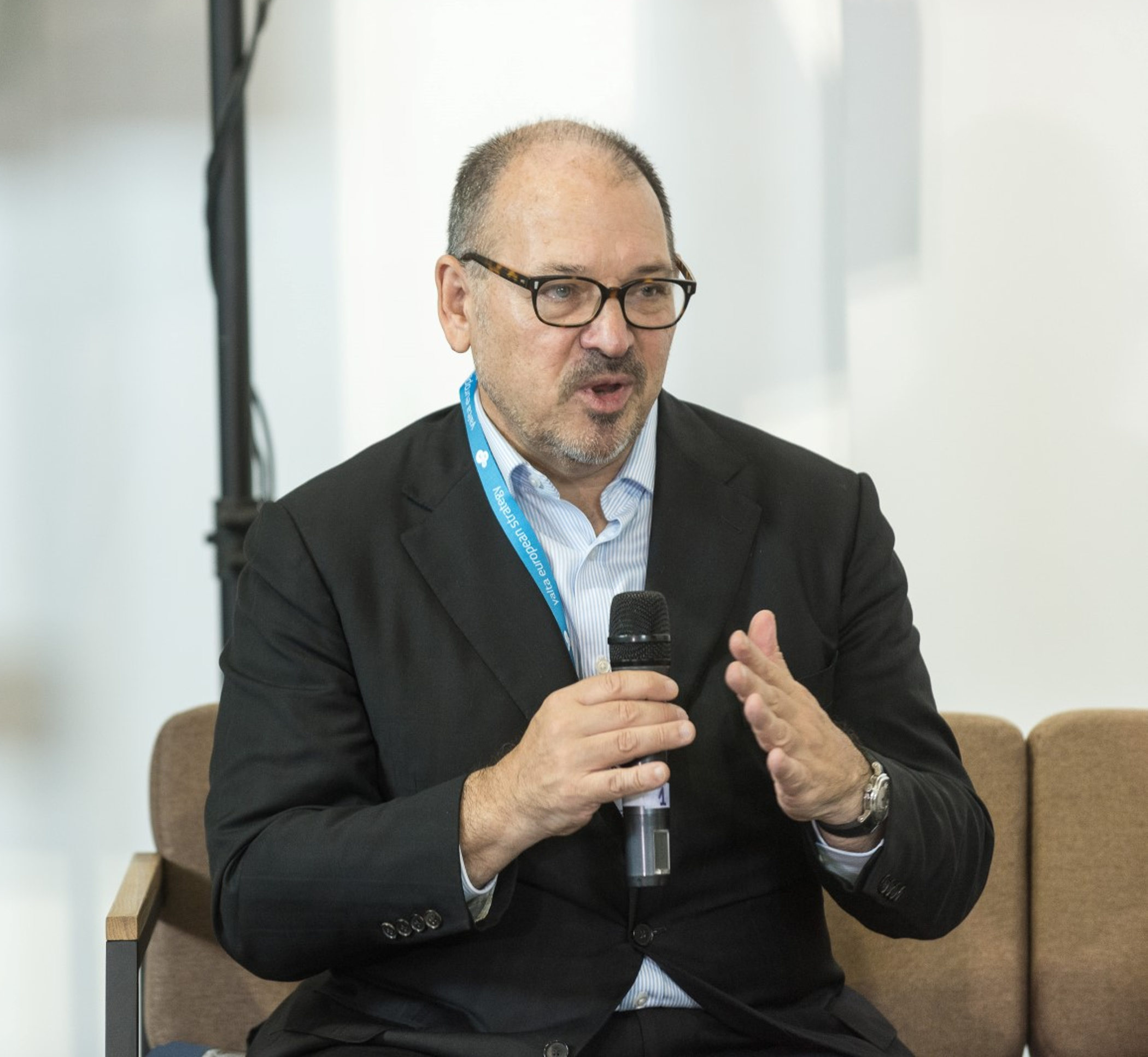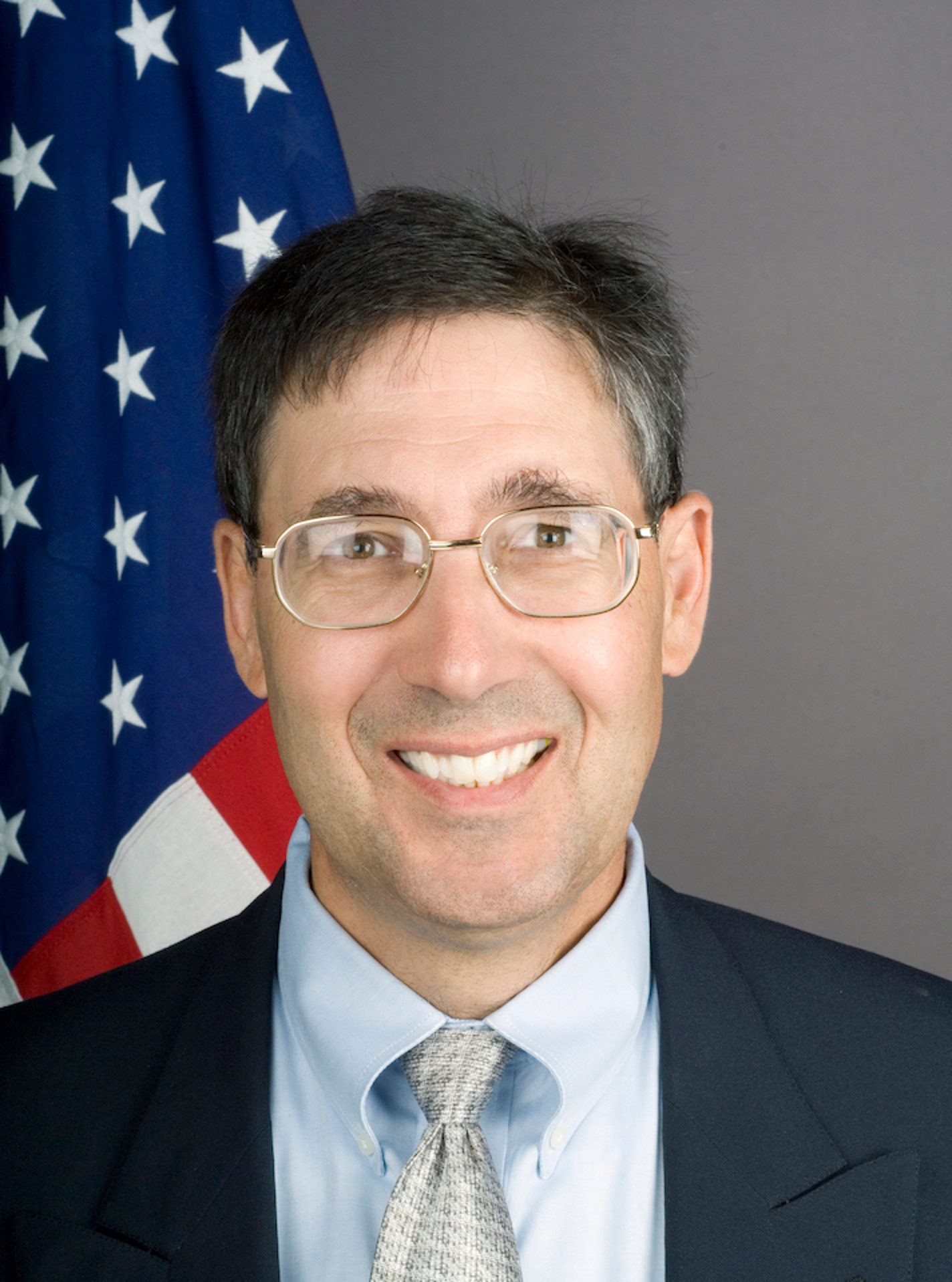Marco Levytsky, National Affairs Editor.
There can be no negotiations on a peace agreement in the Donbas war until such time as a firm and long-standing ceasefire is in place, says one of the opposition leaders in the Verkhovna Rada.
“In our opinion, the only strategy we can use now is to make Russia stop shooting… Stop shooting not for a week, or two, and not only on the point of engagement, but generally. For half a year, or maybe more. Then we can see if both sides are ready to stop the war, and afterwards we can go further and we can talk about political points,” said Svyatoslav Vakarchuk, founder of the reformist Holos political party and member of parliament, during an online teleconference, April 9.

Adrian Karatnycky
Other panelists in the conference entitled “Is Ukraine’s negotiating position changing?”, sponsored by the Atlantic Council and United States Institute of Peace, included Dmytro Kuleba, Minister of Foreign Affairs for Ukraine; Adrian Karatnycky, Senior Fellow, Eurasia Center, Atlantic Council and Managing Partner, Myrmidon Group LLC; former U.S. Ambassador to Ukraine (2006-2009), former Acting Ambassador to Ukraine (June, 2019-January 2020), and currently Vice President, Strategic Stability and Security, United States Institute of Peace, William B. Taylor; and former U.S. Ambassador to Ukraine (2003-2006), currently, Director, Eurasia Center, Atlantic Council, John Herbst.
The webinar, which was moderated by Orysia Lutsevych, Research fellow and manager, Ukraine Forum, Russia and Eurasia Programme, Chatham House, was viewed by 163 participants.
Vakarchuk also stated that his party is very strongly committed to peace on Ukrainian terms and considers any participation by representatives of the so-called Donetsk and Luhansk People’s Republics as a red line that cannot be crossed.
The war in Eastern Ukraine cannot be considered an internal conflict, but one, which was imposed by Russia, he explained.
Similarly, Holos is opposed to the creation of any special status for Donbas as it would threaten Ukraine’s sovereignty and independence even if established on a temporary basis, said Vakarchuk.

Dmytro Kuleba
Kuleba stressed that the government of Ukraine will not engage in any direct talks with the representatives of the rebel regimes and that a consultative council, which had been proposed on March 11 and would have included them, has been rejected.
Both Kuleba and Taylor stated that negotiations on such issues as prisoner exchanges and border crossings are useful and should continue.
Responding to a question whether there are any indications that Russian President Vladimir Putin is interested in ending the conflict in Donbas, Kuleba replied: “I believe that President Putin has no other choice but to withdraw from Ukraine. From Eastern Ukraine and from Crimea as well. Everything else is just a matter of time.”

Bill Taylor
Both Taylor and Herbst agreed with him.
“This is a loser for them (Russians)…This does not bring them benefits. It has only brought them pain and costs. The costs are in the form of sanctions. And sanctions hurt,” said Taylor.
When asked about the feasibility of an international peacekeeping force in the Donbas, he added: “I think that Putin does want to get out of Donbas and I think that an international peacekeeping force authorized by, but not run by, the Security Council is a real option.”

John Herbst
Herbst added that certain people in Russia understand that the war hurts their economy and that they will eventually have to leave.
But Karatnycky rejected this view arguing that a peacekeeping force was a “non-starter” because Putin has no intention of leaving.
He elaborated on this point in response to a later question regarding the possible “Finlandization’ of Ukraine. The term applies to the status of Finland during the Cold War, following its defeat by the Soviet Union in 1944. According to the terms of the treaty, the country was permitted to maintain its independence in domestic affairs, but had to follow strict neutrality rules imposed by the USSR as far as foreign policy was concerned.
Karatnycky noted that there is a fundamental difference between the situation of Finland at that time and that of Ukraine today.
“Russia, or the Soviet Union, had territorial pretensions on Finland. But Mr. Putin has ethno-national pretensions on Ukraine. He isn’t interested in the territory. He is interested in saying that the people of Ukraine are actually the Russian people. So, when we discuss the prospect of peace, what we really have to deal with is the reality that Mr. Putin does not want the existence of either the Ukrainian people, nor the Ukrainian state. So, what we need to do is to find the types of mechanisms that will constrain him until, over time, different leaders find different solutions in Russia,” he said, at which point Vakarchuk piped in “I couldn’t agree more!”
Vakarchuk added that while Ukraine lost the opportunity to engage in closer integration with European countries like Poland and the Baltic states did in the 1990s because it failed to institute the reforms those countries did at that time; it still needs to aim for that goal. However, Ukraine should not look for any guarantees from other states, but act on its own to build stronger armies, establish an independent court system free of corruption, and create a state based upon the rule of law.
Karatnycky said that Ukrainian President Volodymyr Zelenskyy embodied a sense of hope during his election campaign, and this led to a number of unrealistic expectations.
One of the weaknesses of Zelenskyy’s current style of operating is that the core group of people on whom he relies is still very narrowly based. “He has not reached out to embrace in his core inner circle people who’ve had a long period of history in either foreign affairs or even domestic policy”
Zelenskyy needs trusted, seasoned advisers who have a deeper insight of geopolitics.
However, Karatnycky sees the emergence of young members of the Servant of the People party who are willing to take an independent stand as a positive development.
“If the president embraces these people as constructive partners, rather than seeing them as somehow disloyal, I think he will improve his performance and enrich the performance of the administration.”
Both Herbst and Taylor noted that Ukraine enjoys strong bipartisan support in the U.S. Congress, Herbst describing it as “rock solid”.
Asked whether the U.S. would consider stronger sanctions against the Russian Federation, he said it would if Moscow further violates Ukraine’s borders or exacerbates the situation in other ways.
Share on Social Media





































